‘¿Ya Mero Compa?’ digs into the reality of the undocumented gardener
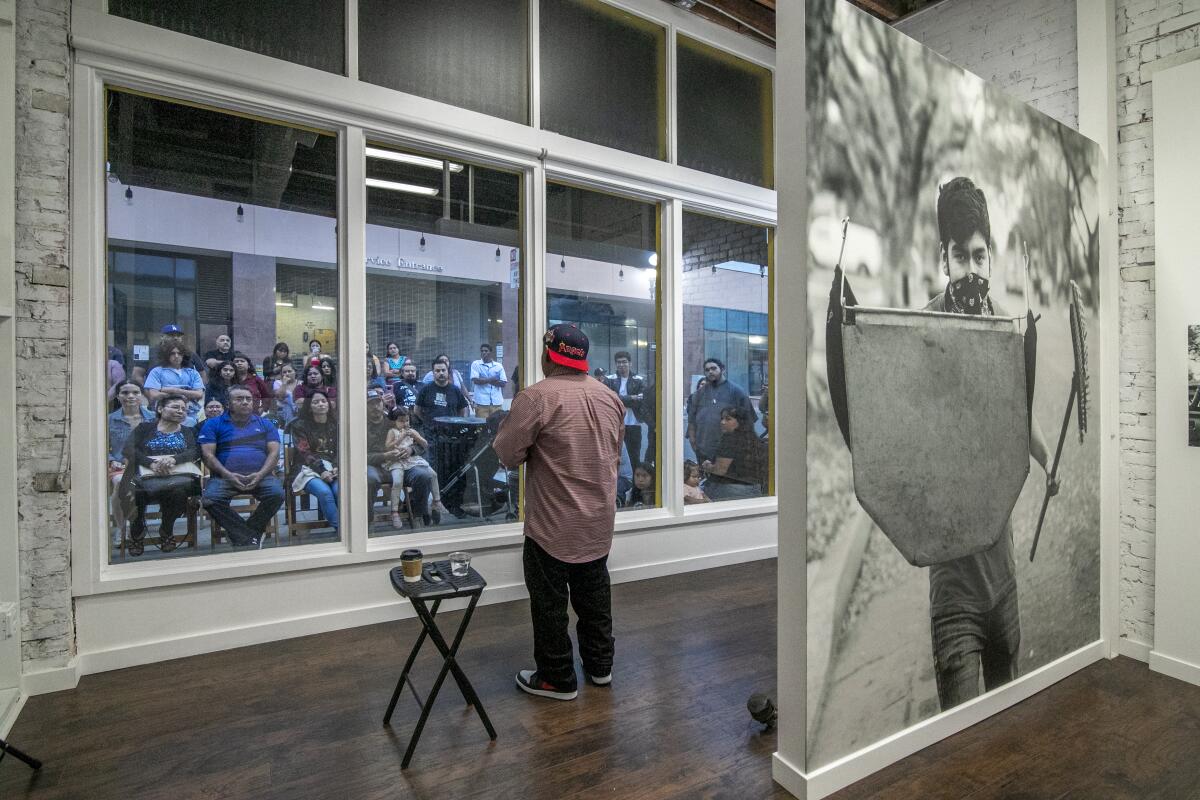
- Share via
The rev of the lawn mower isn’t always a welcome sound, especially when it’s disrupting the quiet of an Orange County neighborhood on a Saturday morning.
For Jesus Cortez, a writer and photographer who began working with his family’s gardening business at a young age, the sound is a familiar one that punctuates the start of the day just as the phrase ‘¿Ya Mero?’ does. The phrase is in the title of his latest multimedia exhibition, ‘¿Ya Mero Compa?’ at Crear Studio on W 5th St. in Santa Ana.
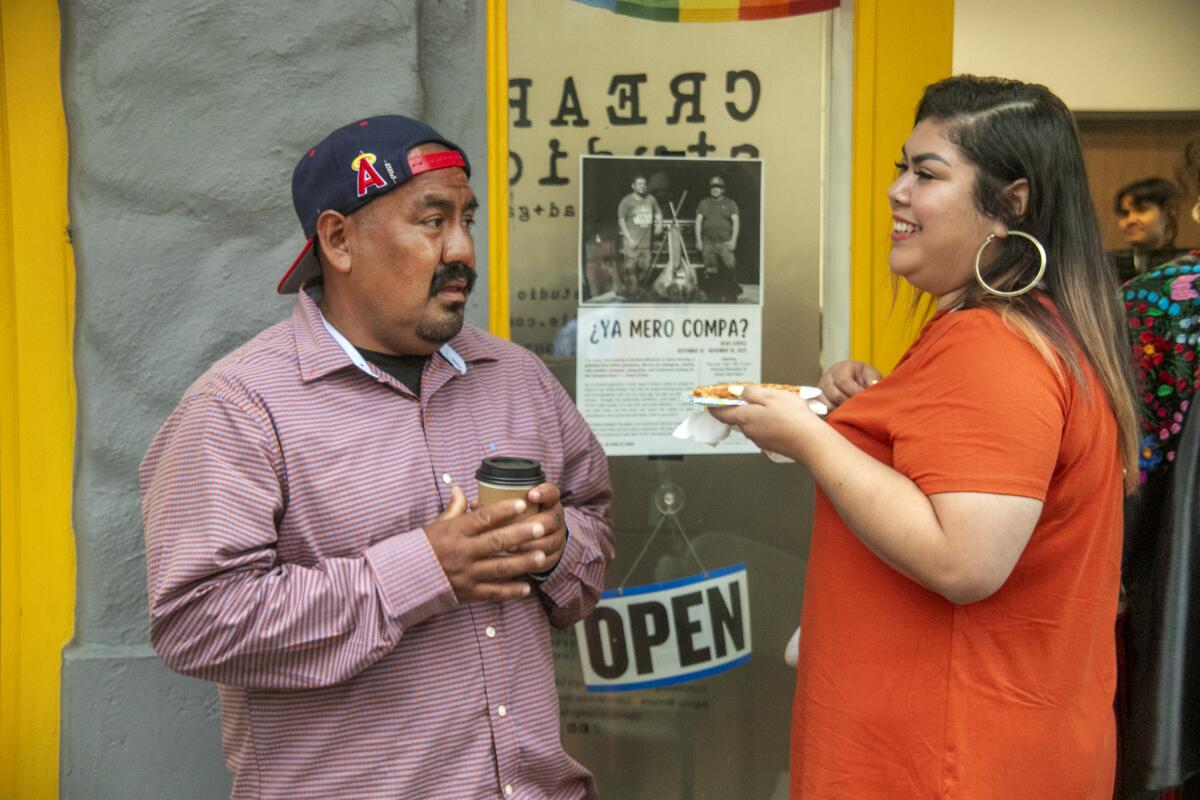
“The show is called ‘¿Ya Mero Compa?’, in reference to workers, not just gardeners, ” said Cortez. “In the morning it can mean just a greeting, a playful greeting because people like to joke around even though we are still stressed about the work that lies ahead. In the afternoon, I take it as, it’s almost over. It’s almost time to go home and rest.”
The slang expression can be translated as ‘almost’ or ‘very soon’ and, as Cortez said, can be used to to express when something is close to being finished or about to start.
Cortez is an award-winning poet, writer and photographer who also works as a gardener, a part of his undocumented reality and the center of his new show, which opened on the evening of Sept. 16 with a special reception and artist talk. On opening day, 110 guests visited the show, the largest turnout for the studio outside of openings during Santa Ana’s monthly art walk.
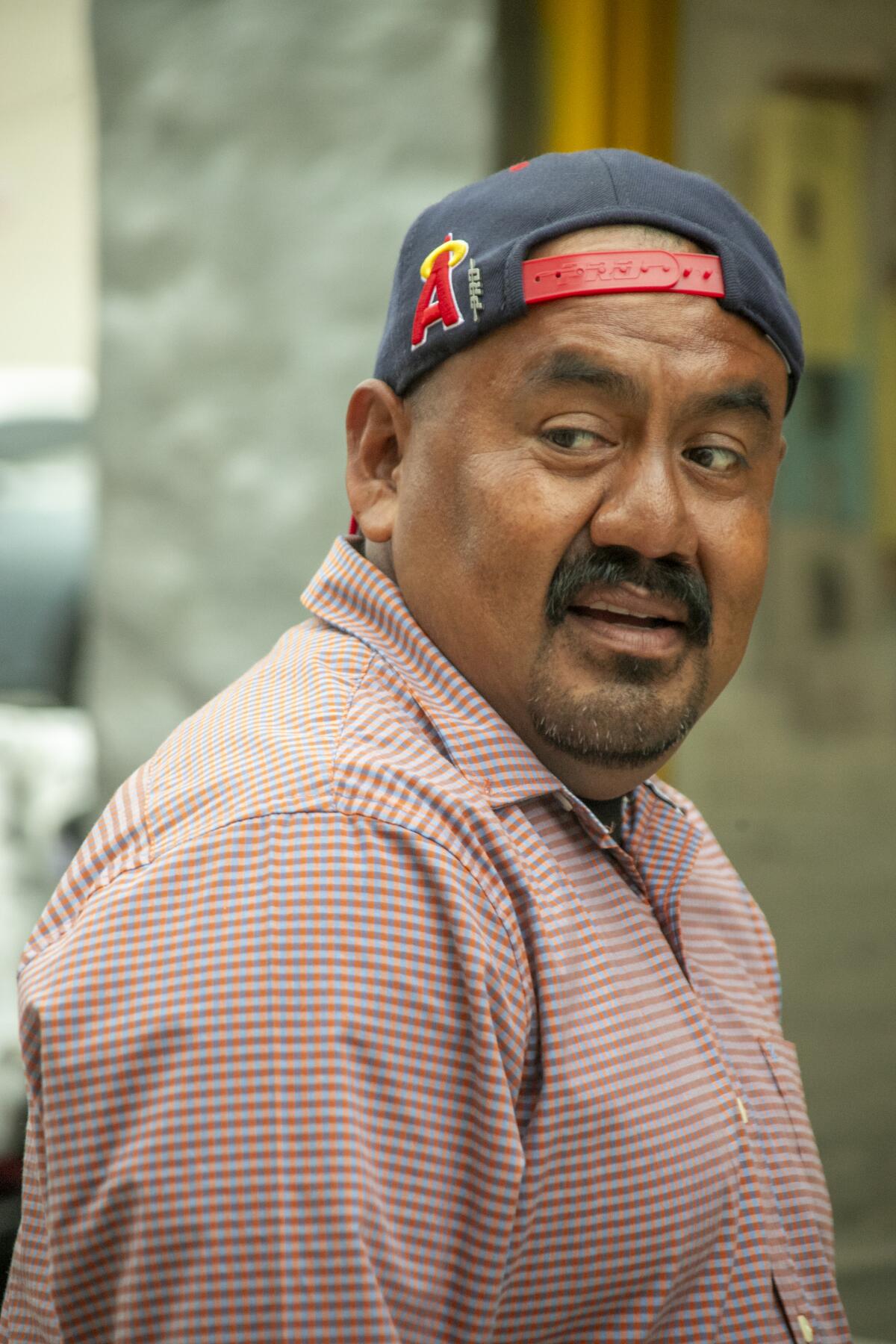
“From what I see, whenever people take photos of workers, they want a reaction. Like pity or sympathy or something of the sort from the viewer,” said Cortez. “I am trying not to do that. I am just trying to show you what it is, and people as they are.”
Cortez photographed his family for this project beginning a few years ago, when he convinced them to allow him to take pictures while they worked. It’s a choice that creates an intimacy that isn’t always found in art that deals with the subject of immigrant labor.
“I feel like this particular project offers a vulnerability that many people don’t consider of day laborers,” said Sarah Rafael García, gallery director at Crear Studio.
The show begins with a portrait of Cortez’s brother-in-law leaning against the flatbed of a truck full of equipment. Audio of a lawn mower and Cortez reciting his poem “And Give Us Your Daily Death” accompanies the show.
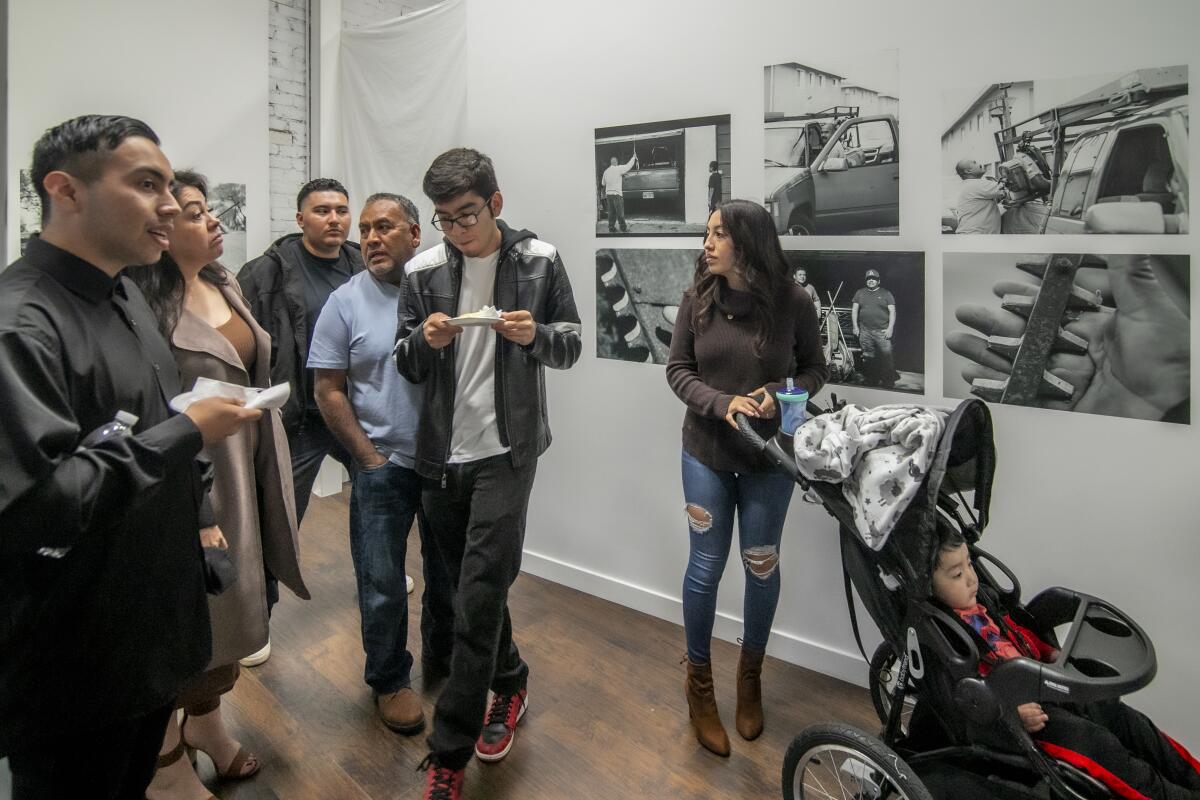
“I think the key that I am trying to get across is dignity,” Cortez said. “Dignified human beings that work every day and struggle every day but are still sticking around.”
Yard work is hard work, and it is not without its risks. In a series of images called “Morning Preparations,” we see hands with injuries and scars.
“Even injured or hurt, there is no stopping work,” said Cortez.
Cortez said he isn’t inviting the viewer to feel sorry but instead challenging them to examine their own relationship with cheap labor. Along the same wall, we also see an image titled “The House of Chava,” with Cortez’s family standing regally around two rakes crossed like a family crest.
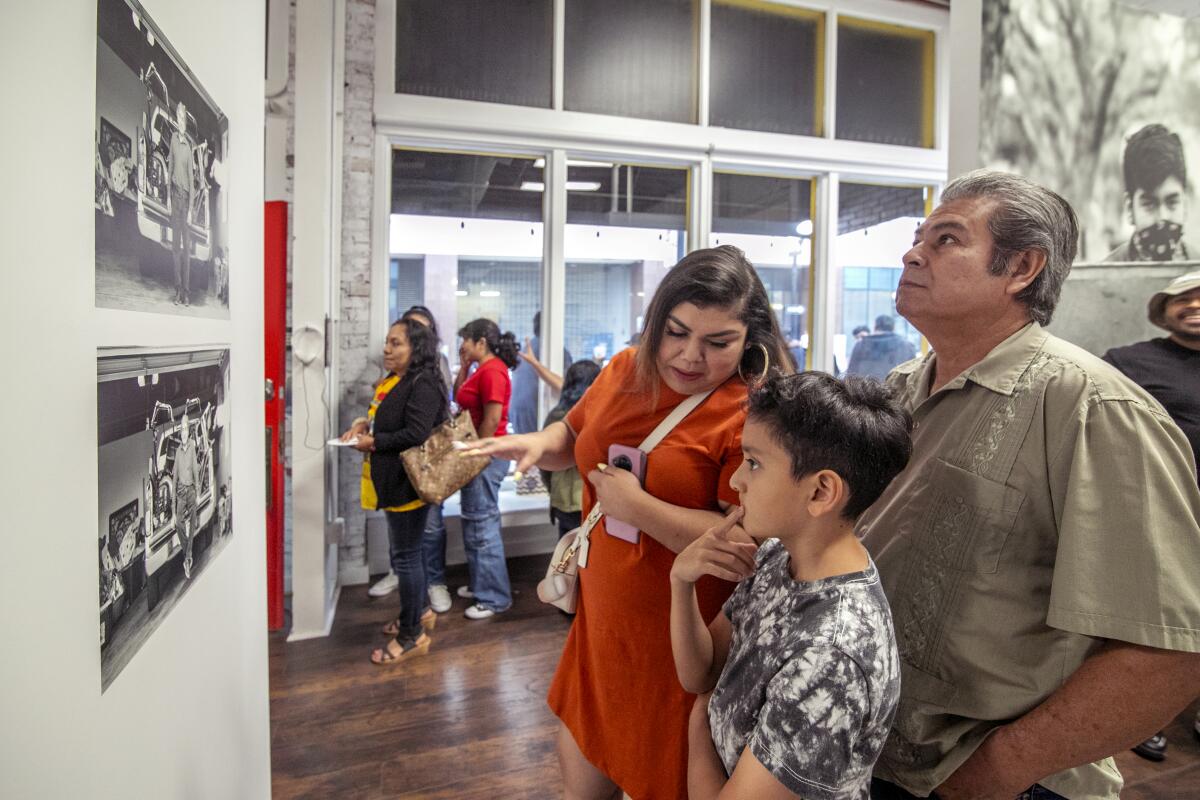
“That’s my brother and his son, but I wanted to capture them with a sense of royalty,” said Cortez. “But I also wanted to focus on the boot he is wearing because he got injured two weeks prior but he still had to go to work.”
There is also humor within the show, reflecting the notion that work isn’t always serious. A large image of Cortez’s 17-year-old nephew, titled “Theft Prevention,” shows him using a leaf loader as a shield and a rake as a sword to guard the equipment in the truck.
“I also wanted to focus on other aspects of work,” said Cortez. “I wanted to to take photos of my nephew and told him to be playful, but show me something different. My idea was to make him look like a superhero.”

An installation titled “Nuestro Señor de los Jardines” features Cortez’s brother. A rake and gardening hoe form a crucifix over a black and white photo of his brother’s arms, outstretched.
“My brother is the one that brought us to this country, and he is the one that gave a lot of us our first job, so I wanted to present him as dignified as possible.”
Cortez also wanted to place emphasis on his brother’s sacrifice.
“I am not a religious person any more, but I understand religious iconography,” said Cortez. “The crucified Jesus to me always signified sacrifice. When I see people working every day and sacrificing their well-being and their health to make ends meet, what is a bigger sacrifice than that?”
Cortez also created fliers with pull tabs like the ones typically found in laundromats and other public places offering cheap labor. But rather than a phone number to call and haggle over a price, Cortez included a short poem that reads “1-800-Dial-A-Beaner. Call, anytime of day, our lines are never busy.”
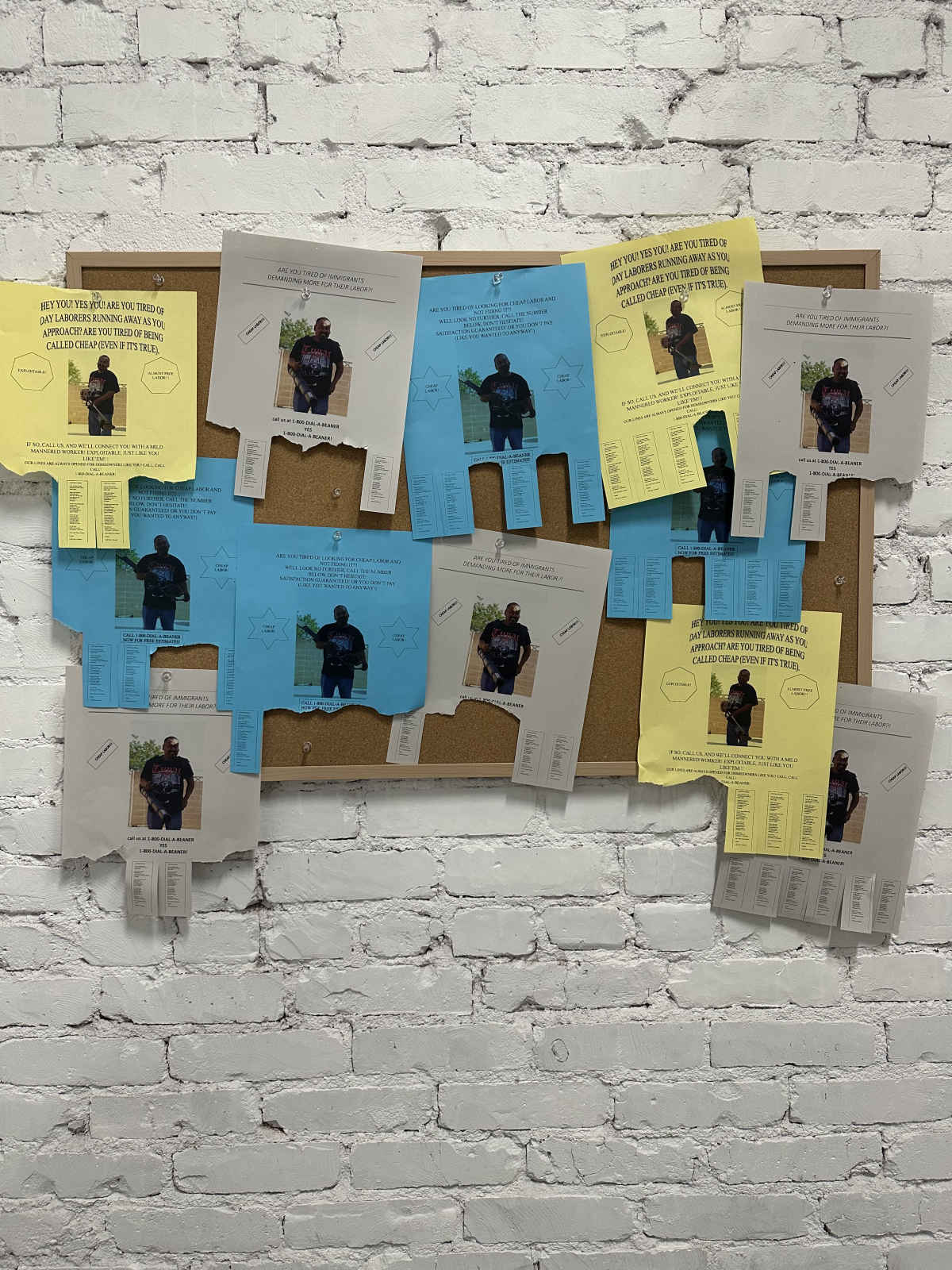
“I wanted to turn it on to the viewer to make you question what it is you see,” said Cortez.
García said the show also allows laborers and workers to see themselves represented reverently in art.
“For us as a space, as Crear Studio, I think it is really important that people that walk by or people that clean our streets see themselves in these spaces. Not just as objects but as humans that are being celebrated. ” García said. “And for me, that is what this show does.”
Cortez hopes it changes the way everyone views low-wage workers and thinks about their own relationship to the early morning lawn mower.

“You should treat us with dignity because we are human beings; that’s it,” said Cortez.
‘¿Ya Mero Compa?’ is open at Crear Studio now through Nov. 18.
All the latest on Orange County from Orange County.
Get our free TimesOC newsletter.
You may occasionally receive promotional content from the Daily Pilot.




